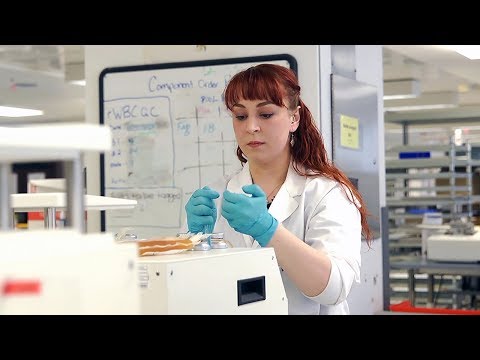Getting a Medical Laboratory Assistant Degree
Contents [show]
If you’re looking for a career in the medical field that doesn’t require years of schooling, then a degree in medical laboratory assisting may be for you. Learn about the necessary requirements and what you can expect from the program.
Checkout this video:
Introduction
Medical laboratory assistants (MLAs) are key members of the healthcare team whose primary responsibilities include collecting and processing patient specimens for laboratory testing. Because of the crucial role they play in ensuring the accuracy of diagnostic testing, MLAs must be properly trained and qualified before they can begin working in a clinical setting.
The good news is that there are many accredited programs across the country that offer MLA training, and most of them can be completed in less than two years. In order to become an MLA, you will need to complete a medical laboratory assistant degree or certificate program from an accredited institution. These programs typically take one to two years to complete and typically result in an associate’s degree or certificate.
What is a Medical Laboratory Assistant?
A medical laboratory assistant (MLA) is a professional who works under the supervision of a medical laboratory technologist (MLT) to perform routine tests in a clinical laboratory. These tests are used to help diagnose and treat patients with various medical conditions.
MLAs typically have at least a high school diploma, although some positions may require postsecondary education, and must complete on-the-job training. They must also be licensed in some states.
Working conditions for MLAs vary depending on the size and location of the facility in which they work, but they generally work in well-lit, clean laboratories and use computerized equipment. Some MLAs may be exposed to infectious diseases or dangerous chemicals, so they must follow safety protocols to protect themselves.
MLAs typically work full time, although some positions may be part time or variable hours. Some MLAs may be required to work evenings or weekends.
The roles and responsibilities of a Medical Laboratory Assistant
The roles and responsibilities of a Medical Laboratory Assistant (MLA) vary depending on the setting in which they work. In general, MLAs perform a variety of technical and clerical tasks to support the work of medical laboratory technicians and technologists.
While the duties of an MLA can vary depending on the specific workplace, there are some common tasks that MLAs often perform. These tasks may include:
-Collecting and processing blood, tissue, and other bodily fluid samples from patients
– labeling, storing, and retrieving samples
-preparing samples for testing
-performing basic laboratory tests
– documenting results and reporting to supervisors
-maintaining laboratory equipment
The education and training required to become a Medical Laboratory Assistant
Medical Laboratory Assistants (MLAs) play an important role in the healthcare team, providing vital support to Medical Laboratory Technologists (MLTs) and other health care professionals. MLAs typically work in hospitals, diagnostic laboratories, public health facilities and research institutes.
In order to become a MLA, you will need to complete an accredited MLA program. These programs are typically two years in length and cover topics such as human anatomy, physiology, medical laboratory procedures and instruments, specimen collection and processing, quality assurance and safety. Many programs also include a paid internship component that allows students to get real-world experience working in a medical laboratory.
The skills required to be a successful Medical Laboratory Assistant
In order to be a successful Medical Laboratory Assistant, there are a few key skills that you will need to possess. First and foremost, you must be detail-oriented. Medical Laboratory Assistants are responsible for collecting and analyzing patient samples, so it is important that they are able to pay close attention to detail in order to ensure accuracy. Good time management and organization skills are also essential, as Medical Laboratory Assistants often have to handle a large volume of work. Additionally, Medical Laboratory Assistants must be able to work well under pressure and have excellent problem-solving skills.
The job outlook for Medical Laboratory Assistants
Since the job outlook for medical laboratory assistants is positive, many students are wondering how to become a medical laboratory assistant. The first step is to obtain a degree from an accredited institution. Although a degree is not required for all positions, it is recommended for those who wish to pursue a career in this field. Many employers prefer to hire candidates with at least an associate’s degree in medical laboratory science or a related field. After completing a degree program, students can then take the certified medical laboratory technician (CMLT) exam to earn their certification.
The salary and benefits of being a Medical Laboratory Assistant
A recent study by the American Medical Association (AMA) showed that the median salary for medical laboratory assistants was $32,000 per year. The median salary for all other Health Care occupations was $28,000 per year. That means that medical laboratory assistants make about $4,000 more a year than other health care workers.
The AMA study also showed that medical laboratory assistants had better benefits than other health care workers. They were more likely to have health insurance and retirement plans. They were also more likely to have paid vacation days and holidays.
If you are thinking about a career in the medical field, you should consider becoming a medical laboratory assistant. You will be well-paid and have good benefits.
The challenges faced by Medical Laboratory Assistants
There are many challenges faced by medical laboratory assistants. One of the biggest challenges is the intense competition for jobs. With the current economy, many hospitals and clinics are downsizing or closing their laboratories. This means that there are fewer jobs available for medical laboratory assistants.
Another challenge faced by medical laboratory assistants is the need to constantly update their skills. As new technology is developed, medical laboratory assistants need to be able to use it in order to be effective in their jobs. This can be a challenge, as it requires constant training and education.
Lastly, medical laboratory assistants may sometimes be required to work long hours, including nights and weekends. This can be challenging, as it can interfere with personal schedules and family life.
The future of the Medical Laboratory Assistant profession
The medical field is always in need of trained professionals to work in various capacities, and the role of medical laboratory assistant is no exception. Getting a degree in this field can lead to a number of different career opportunities, and the demand for qualified workers is only expected to grow in the coming years. Here’s a look at what you can expect from the future of the Medical Laboratory Assistant profession.
There are a number of reasons why now is a great time to enter the medical field as a medical laboratory assistant. For one, the aging population is resulting in more people needing medical care. In addition, advances in technology are leading to more sophisticated tests and treatments that require trained professionals to administer them. As a result, the demand for qualified medical laboratory assistants is expected to grow significantly in the coming years.
One of the most appealing aspects of working as a medical laboratory assistant is the fact that it is a highly versatile position. Many workers in this field start out working in hospitals or clinics, but there are also opportunities to work in private laboratories, research facilities, or even pharmaceutical companies. No matter where you end up working, you’ll be playing an important role in helping doctors and other healthcare professionals provide quality care to their patients.
If you’re interested in pursuing a career as a medical laboratory assistant, now is an excellent time to do so. With the aging population and advances in technology resulting in increased demand for qualified workers, there has never been a better time to enter this growing profession.
Conclusion
Medical laboratory assistants (MLAs) are an important part of the healthcare team. They work in clinical laboratories and perform a variety of tasks, such as collecting and processing blood, urine, and tissue samples.
While it is possible to become an MLA without formal training, most employers prefer to hire candidates who have completed an accredited MLA program. These programs typically take one to two years to complete and are offered by community colleges, technical schools, and online universities.
Upon completing an accredited MLA program, graduates will be prepared to sit for the national certification exam administered by the American Medical Technologists (AMT). Once certified, MLAs can find employment in hospitals, clinics, physician offices, and public health facilities.







